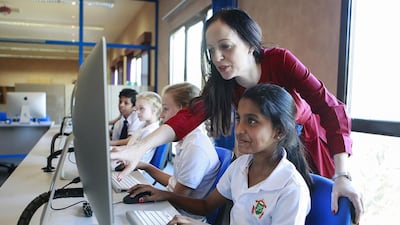DUBAI // Constant vigilance and communication with children is the first line of defence when it comes to protecting them from the dangers of the internet, say parents.
Despite the sense of safety of many UAE residents, paedophiles grooming children online and viewing child pornography was a concern.
Dubai Police said they arrested 25 people last year for trying to access child pornography or engaging inappropriately with minors.
Lt Col Saeed Mohammed Al Hajiri, director of the cyber investigation department, said that the suspects were all foreigners and have since been deported.
Nicki Naude, from South Africa, said her nine and 11-year-old daughters use Instagram and she was connected with both of them on the photo-sharing app.
“I monitor what they are doing and what they are getting in from Instagram,” she said. “I have had to teach them it’s not necessarily a good thing to have many friends on social media.”
Ms Naude added: “Now, if someone requests [to follow them], they ask me whether they should accept it, and I ask them where they know them from and whether they know them well enough. We have a discussion.”
Ms Naude said that it was important not instil fear in children when it came to the internet, as it was now a part of everyday life. “They cannot be afraid of the internet because it’s just there but we have to teach them and guide them how to use it,” she said.
Indian mother Sagarika Khalko said she was very careful when her nine and 10-year-old girls were using the internet and neither were allowed on social media websites.
She said that they had an “open house system” whereby all devices in the home were accessible by the same username and password and that everyone could use them. This way, she said, everyone could monitor what everyone else was viewing on the internet.
Gems Jumeirah Primary School, in Al Safa, held its first Digital Citizenship Week earlier this month in an effort educate parents and teach children to access the power of technology safely, respectfully and responsibly. The school’s wellbeing department had been tasked with integrating the programme into the curriculum.
Ceyda Conroy, a mother to two boys aged two and five, said the programme made her understand better the digital world.
“I’m not signed up to Facebook, Twitter or Instagram, and I don’t know anything about these things. My five-year-old son uses the iPad for games now but soon he will be getting online,” said the Turkish national. “I feel I need to protect my children and, to do that, I have to update myself and first teach myself about these things.”
Egyptian Lamia Gabr said the school’s internet safety efforts had been a wake-up call.
“They showed us videos and taught us about bullying online, and I went back home and thought to myself: is what I’m doing enough?” said Ms Gabr, who had four children between the ages of five and 15. “The internet in my home is limited to the open areas, and mobile phones are not allowed into the rooms.”
She said that it was easy to keep access to the internet under control with her two youngest, aged five and six, but, with the older children, aged 13 and 15, it was more of a challenge.
“I make sure to talk to them and constantly remind them to be careful and not post anything inappropriate,” said Ms Gabr, who had access to the two older children’s Facebook accounts.
Educational psychologist Roisin Duffy, head of JPS’s wellbeing department, said it was important that parents talked to their children and that there was a balance when it came to using the internet.
“We tell the children to be careful and that there are things to be wary of, but we don’t go into too much detail on what could happen, in case it frightens them,” she said. “The internet is there to be enjoyed and not something to be afraid of, so there needs to be a balance.”
She added that children could be affected if they were to see something that they cognitively did not understand or did not have the social and emotional awareness to actually deal with it.
“Seeing trailers to horror movies can have a huge impact, because they can’t sleep at night. Children who play games online too much may not be socialising and properly interacting with others,” said Ms Duffy.
“We encourage parents to make a contract or an agreement with their children on how they should use the internet, how to use the devices and for how long.”
dmoukhallati@thenational.ae

